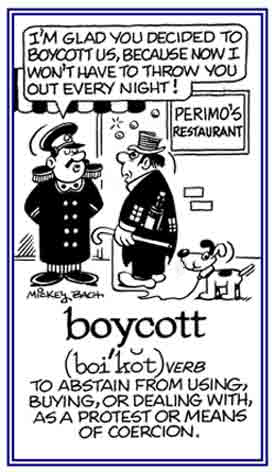Economical, Business, and Financial Terms +
(economics involves business and financial activities that show how people choose to use their limited resources (land, labor, and capital goods) to produce, exchange, and to consume goods and services)
A tightened economy characterized by shortages: The state of austerity or deficit-cutting in a country is marked by or requires lower spending and/or higher taxes.
A national policy of self-sufficiency, including elimination of imports: It is not the usual case that a nation desires to be in a situation of autarky and refrain from buying any foreign goods.
The replacement of human laborers with machines; especially: It is often the case that automation in firms using self-regulating machines and computers reduce manpower, or the number of workers.
A periodic summary of difference between a nation's total payments to foreign countries and its receipts from them: The balance of payments is the difference between the money that a country spends on imports and the money received from exports.
The difference in monetary value between a nation's imports and its exports: The balance of trade of a country is good and profitable when the exports surpass its imports.
Spending equal to revenue. especially, in government: The situation of a balanced budget is when existing expenditures are identical or tantamount to the receipts.
The inability to pay one's debts or legal insolvency: The little firm decided to file for bankruptcy because it didn't have enough money to pay its bills anymore.
A measure to reduce expenditures, cut costs, and to eliminate deficits: Because the family had too many debts, they decided that belt-tightening was essential which meant increased thrift and frugality and less spending!
A source of great wealth or profits: Mary thought that playing in the lottery, and winning, would be the bonanza of her life, but it didn't work after all.
High level of economic activity period of business expansion: The nation's big boom was marked by growth, prosperity, and progress. and not by a recession.
A government project of little practical value funded to gain political favor: Critics say the dam project is a complete boondoggle because it is over budget, behind schedule, and unnecessary.

© ALL rights are reserved.
Go to this Word A Day Revisited Index
There are those who say that a boondoggle is often a wasteful or pointless business venture or a useless government program.

Go to this Word A Day Revisited Index
so you can see more of Mickey Bach's cartoons.
bottom out (verb), bottoms out; bottomed out; bottoming out
To level out at a low point in a business cycle: The population of the country was glad to hear that the recession had bottomed out, and that the economy was slowly improving.
1. An affluent middle-class people characterized as conventional, conservative, or materialistic in outlook: As a merchant, Mr. Thompson belonged to the bourgeoisie and had enough money to travel and enjoy art museums and concerts.
2. The class of capitalists: The bourgeoisie is a social class that, according to Marxist theory, owns the means of producing wealth and is regarded as exploiting the working class.
2. The class of capitalists: The bourgeoisie is a social class that, according to Marxist theory, owns the means of producing wealth and is regarded as exploiting the working class.
boycott (verb), boycotts; boycotted; boycotting
1. To cease or to refuse to deal with something, such as an organization, a company, or a process, as a protest against it or as an effort to force it to become more acceptable to those who are dealing with it: Many people in the city have been boycotting the busses because of their inefficient services.
2. To refuse to trade with a business, a person, or a nation as punishment or a means of persuasion: The leaders of a certain country say they will boycott the products of companies that are polluting the environment.

© ALL rights are reserved.
Go to this Word A Day Revisited Index
2. To refuse to trade with a business, a person, or a nation as punishment or a means of persuasion: The leaders of a certain country say they will boycott the products of companies that are polluting the environment.

Go to this Word A Day Revisited Index
so you can see more of Mickey Bach's cartoons.
Also see this Index or Menu for a variety of other topics.
Showing page 2 out of 2 pages of 29 main-word entries or main-word-entry groups.

